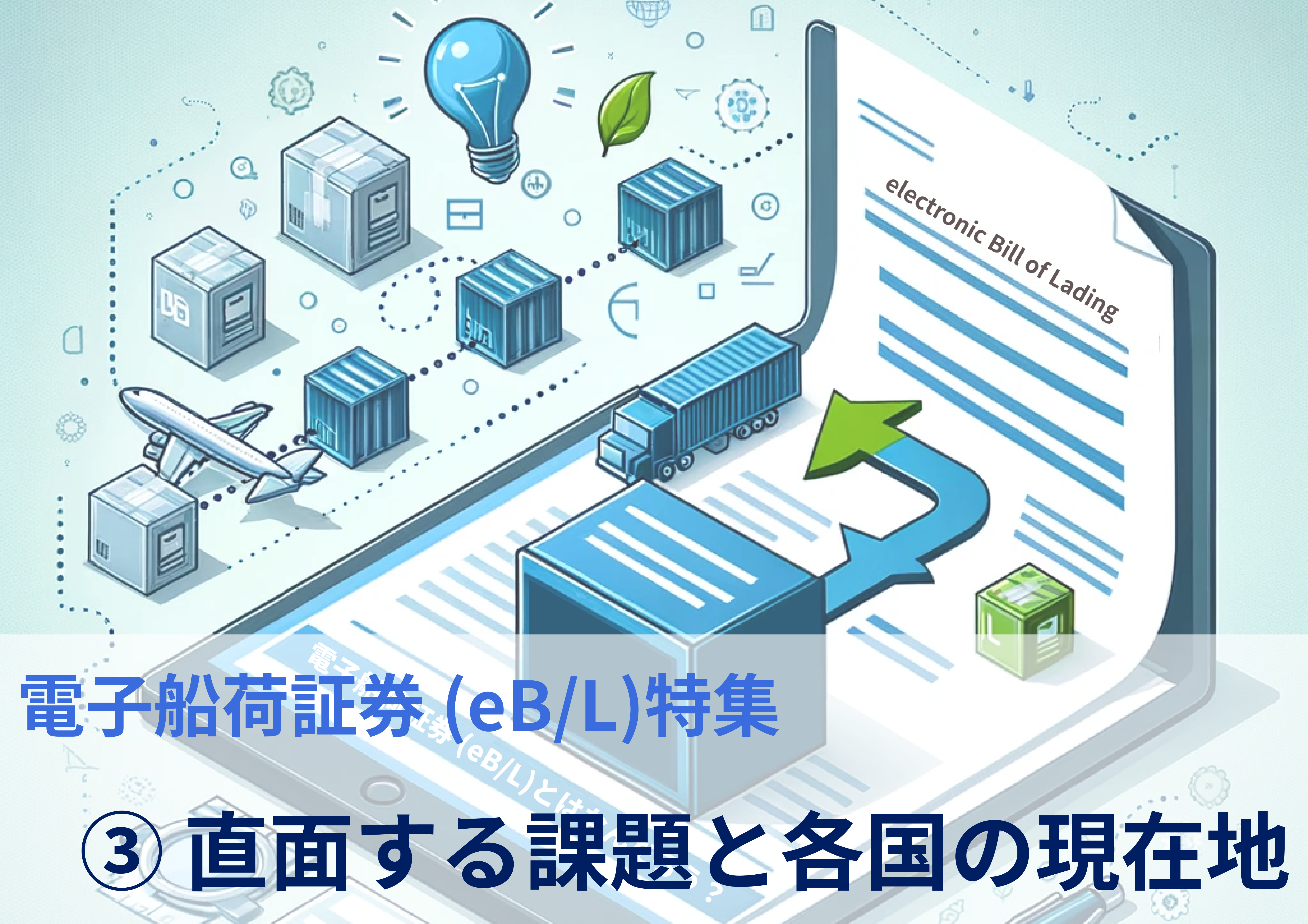2024.3.26

*This column is a serial.Here*
As we introduced in the first and second installments, the bill of lading (B/L) has long been an important instrument in the history of international trade, fulfilling multiple roles such as document of contract, receipt of goods, and document of title.
Bills of lading (B/L) have been exchanged on paper for centuries, and this practice remains deeply rooted in maritime law and trade practices even in today's world where digital transformation is on the rise.
In order to solve the inefficiencies, risks, and costs associated with paper-based transactions, the move towards electronic bills of lading (B/L) was underway.
Since the late 1990s, there have been many projects to develop electronic solutions that could replicate the functions of the paper bill of lading (B/L) while offering additional benefits.
In addition, cutting-edge electronic bills of lading (eB/L) that utilize blockchain and cloud technology will enhance security and reduce operational costs, enabling a major shift compared to traditional paper-based transactions.
However, despite these ongoing efforts, electronic bills of lading (eB/L) have yet to become widespread, with paper-based bills of lading (B/L) still in common use around the world.
Why is this happening?
This time, we will explore the reasons for this and also introduce the current state of legal systems in each country.
■Challenges and solutions hindering the transition to electronic bill of lading (eB/L)
1) Legal and regulatory issues
One of the major challenges facing electronic bills of lading (eB/L) is legislation: most countries around the world do not have legislation in place to formally define and encourage the widespread use of eB/Ls, and existing legislation often favours paper-based exchanges.
Although some countries, such as Singapore, the United Kingdom, and Bahrain, have made progress in establishing laws to accommodate electronic bills of lading (eB/L), it must be said that there is still a long way to go before it becomes an international standard.
The UNCITRAL (United Nations Commission on International Trade Law) defines MLETR (Model of Electronically Transferable Records) as
The Dell Act sets out the idea of assuming the provisions of existing bills of lading (B/L) and establishing similar provisions for electronic bills of lading (eB/L), which is a valuable step towards the global standardization of eB/L.
However, it is said that it will be difficult to reduce the use of paper bills of lading (B/L) unless old practices in the trading industry can be changed.
For example, just like traditional bills of lading (B/Ls), electronic bills of lading (eB/Ls) can guarantee payment responsibility regarding ownership when entrusted to a third-party intermediary such as a bank or insurance company. However, third-party institutions such as banks and insurance companies require the submission of a paper bill of lading (B/L) at the same time as the eB/L, which has created the problem that transactions cannot be completed with just the eB/L, and in the end a paper bill of lading (B/L) is used.
②Technical issues for global standardization
For electronic bills of lading (eB/L) to become widespread around the world, technical challenges must be resolved, such as integrating various systems and ensuring interoperability between different platforms.
Multinational formats and protocols for the issuance, transmission and storage of electronic bills of lading (eB/L) must be established to ensure compatibility between different systems and regions.
■Regulatory status and market trends in each country
The Electronic Trade Documents Bill has now passed Parliament in the UK, giving digital trade documents the legal equivalent of paper documents and is expected to lead to the widespread use of electronic bills of lading (eB/L) under UK law, which has a major impact on international contracts and bills of lading.
Additionally, countries such as Bahrain and Singapore have been quick to enact legislation to promote the use of electronic bills of lading (eB/L).
Bahrain is the first country to enact a Model Law on Electronic Transferable Records, which includes provisions for the use of blockchain in the fintech and logistics sectors.
Singapore has followed suit, amending its Electronic Transactions Act to adopt the UNCITRAL Model Law on Electronic Transferable Records, supporting the creation of electronic bills of lading (eB/Ls) and their legal equivalence to paper bills of lading (B/Ls).
Spain has also adopted legislation enabling the use of electronic trade documents, including electronic bills of lading (eB/L).
Related industry associations are also taking action.
The marine insurance association, the P&I Club, has formally endorsed several electronic bill of lading (eB/L) software platforms, including CargoX, driving acceptance and standardization within the industry.
International shipping association BIMCO has been advocating for the adoption of electronic bills of lading (eB/L), particularly in the bulk sector, and stressed the need for greater efforts to ensure companies of all sizes have access to advanced digital technology.
Then in 2023, nine of the world's major shipping companies that are members of the Digital Container Association (DCSA) announced their intention to achieve 100% adoption of electronic bills of lading (eB/L) by 2030.
To achieve this, the company has set an intermediate goal of digitizing 50% of original bills of lading (B/L) within the next five years.
Japan is currently in the process of considering the introduction of electronic bills of lading (eB/L) and the associated regulations, with a bill on the eB/L Act expected to be submitted to the Diet sometime in 2024.
The main focus is on whether legislation can be reformed to incorporate electronic bills of lading (eB/L) while retaining existing legal concepts, such as ownership and securities laws under Japan's civil and commercial codes.
Attention is also being focused on how to determine the management entity for electronic bills of lading (eB/L).
(Continued in ④)
For trade-related inquiries, please contact us here.